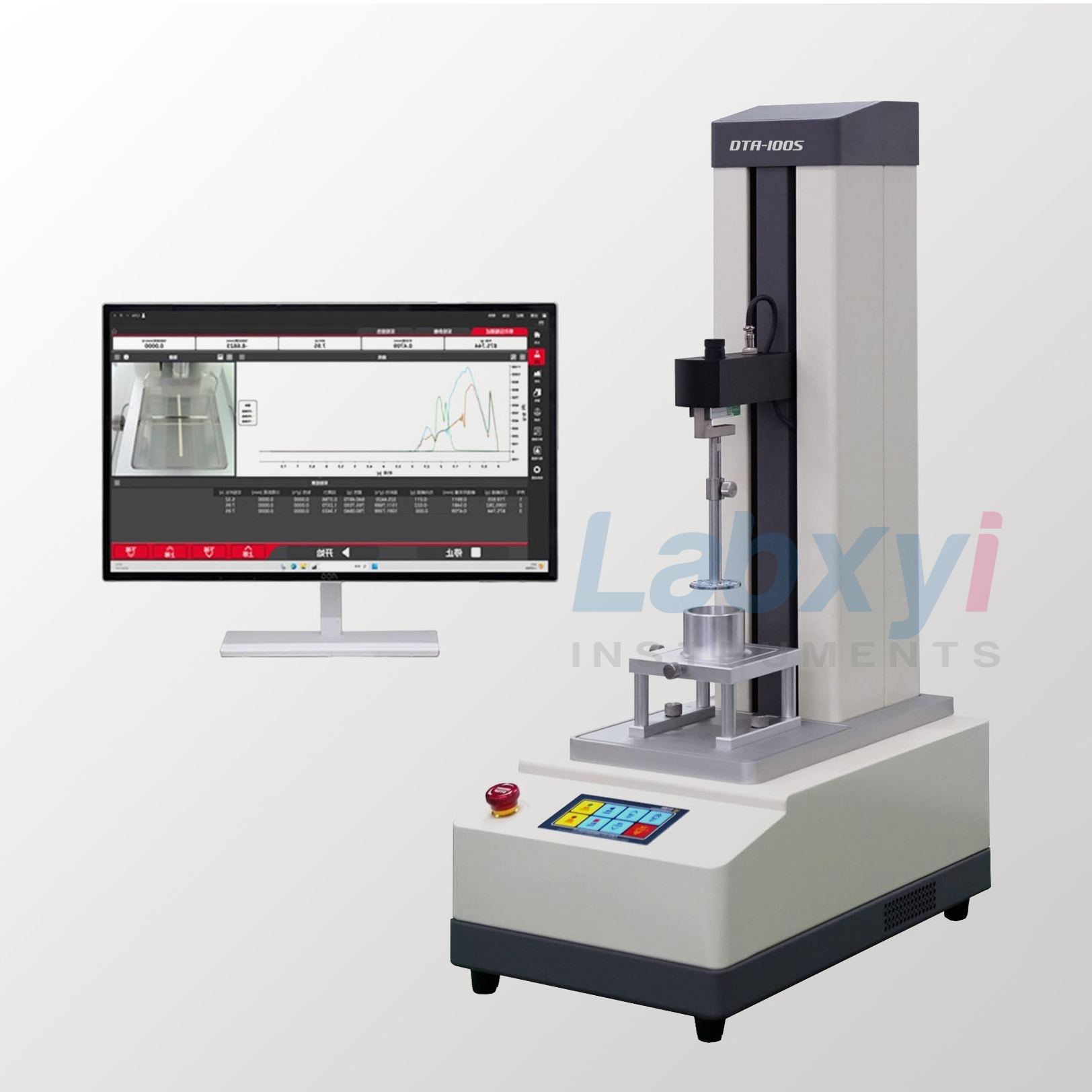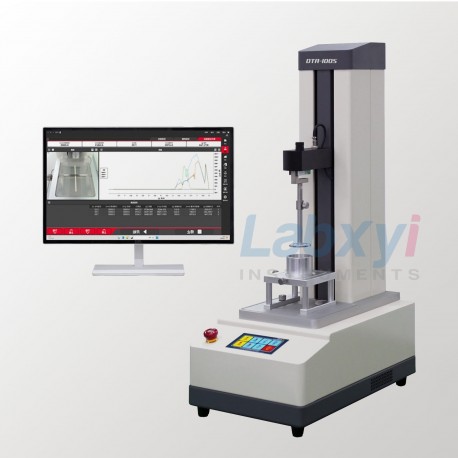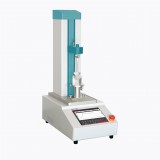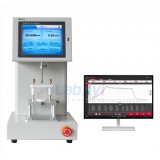Texture Analyzer
DTA-100S
DTA-100S is used in gelatin, carrageenan, codran gum, frozen surimi gel, agar compound hydrogel, pharmaceuticals, cosmetics, dairy products, meat products, aquatic products, grain and oil foods, rice products, flour products, Physical property analysis of samples such as traditional Chinese medicine, tobacco, fruits and vegetables, baked goods, jelly, candy, jam, etc.;
- Remove this product from my favorite's list.
- Add this product to my list of favorites.
Product info

※ DTA-100S product advantages
1.1 Use the touch keyboard as an auxiliary key , which is handy and makes testing more convenient.
1.2 The force sensing element can be replaced quickly and safely. Through the conversion of the force sensing element, the detection range can be changed, and the sensing resolution can be changed to adapt to different sample analyses.
*1.3 Provides video and picture capture functions, which can record the entire test of important samples, display it in the software window synchronously with other test data and strain curves of the test, and save it simultaneously to a traceable database .
1.4 The data collection rate of 3,000 groups per second can capture the precise moment when the sample changes, rejecting missed judgments and misjudgments.
※ Application of DTA-100S
DTA-100S is used in gelatin, carrageenan, codran gum, frozen surimi gel, agar compound hydrogel, pharmaceuticals, cosmetics, dairy products, meat products, aquatic products, grain and oil foods, rice products, flour products, Physical property analysis of samples such as traditional Chinese medicine, tobacco, fruits and vegetables, baked goods, jelly, candy, jam, etc.; can accurately quantify the gel strength, hardness, crispness, tenderness, viscosity, elasticity, toughness, and cohesiveness of the sample , chewability, tensile strength, bursting strength, shear strength, compressive strength, penetration strength, creep characteristics, relaxation characteristics and many other physical property indicators.
※ Main technical parameters and characteristics
MODEL | DTA-100S |
Force sensor unit size | 20 Kg ( 0.5 , 1, 2, 5, 10, 20, 25Kg optional) |
Force analysis accuracy | 0.001g (real-time synchronous display) |
Force accuracy error | ≤±0. 0 1 % |
Multiple protection functions | emergency braking, upper and lower limit control, force sensing element overload protection (customizable over-standard warning settings), and detection data encryption. |
Measuring arm range | 0 ~ 310mm |
*Displacement analysis accuracy | 0.0001mm (real-time synchronous display) |
Detection rate | 0.01~ 40mm /s |
Detection rate error | ≤1 % |
*Data collection rate | up to 3000 groups/s selectable 200, 500, 1000, 2000 |
*Power accuracy verification measurement and automatic correction |
|
*Deformation displacement accuracy verification measurement and automatic correction |
|
Test methods |
|
※ System software introduction
4.1 Comprehensive test mode program editing functions; run, preset, repeat, cycle, clear, zero calibration, assignment, variables, formulas, calculation, playback, comparison, annotation, etc. Through the editing of these program commands, various detection modes can be realized, various test models can be built, and various required test data can be obtained.
* 4.2 Test playback: The software automatically records the entire test process (including synchronous video recording) , and provides multi-method intelligent retrieval . Tests of any period can be traced for data restoration, curve redrawing and synchronous video playback , and the test details of the queried sample can be viewed and analyzed.
*4.3 The software can simultaneously select 5 current or historical test results (function curves, measurement data, and synchronized recordings) for comparison and analysis.
The software can realize the overlay display of multiple texture curves in different colors, making it convenient and intuitive to compare and analyze the results of multiple experiments.
4.4 Data analysis: The software can display four function curves: force ~ time, force ~ distance, distance ~ time, and stress ~ strain. The curve contains a scale, which can be arbitrarily scaled locally or automatically adjusted by the system. At the same time, key data points can be automatically marked. During data analysis, any area of the selected graph domain, any required data point parameters, Automatically calculate results (including curves, superimposed curves, pictures and data) and automatically generate and export Excel/Word/PDF files.
4.5 The system software of DTA-100S has more in-depth solutions and descriptions for each test. In addition to the regular test mode, extended and customized program editing and practice are also prepared for users. Customized reports and test charts can be easily created; test data can be directly exported to Excel/Word/PDF and other formats, and operations such as data export, graphing, saving, comparison, and professional report generation can be performed .
4.6 The software supports detection modes: timing, fixed displacement, fixed load, single cycle, multiple cycles, compression, stretching, puncture, shear, bending, extrusion, gluing, tearing, maintaining , intermittent, rupture, breakage , relaxation, creep, custom modeling, etc.
4. 7 The software operation interface is friendly: the menu bar, tool bar, status bar, display bar, curve box, video box, and experimental process are clear, and the control buttons are convenient and fast.
4. 8 The software provides two operating systems, Chinese and English, which can be switched with one click.
4.9 The software technical support function is powerful. Users can find any tips, routines, analysis, methods or links you need in the drop-down menu of the "Help" column of the software . It provides 24 classic case methods for testing major categories and 20 practical teaching videos to help you quickly become an expert in physical property analysis.
*4.10 The software has a copyright certificate approved by the National Copyright Administration of the People's Republic of China. The full name of the software is "Texture Analyzer Control Analysis Software". The software has the functions of operation, control and data analysis of the texture analyzer . Software data analysis algorithms: including but not limited to principal component analysis algorithm, linear discriminant analysis algorithm and partial least squares regression algorithm. In this way, quantitative measurement and evaluation of human senses and instruments can be realized, and the mechanical characteristics of the sample can be obtained, thereby helping the tester to obtain relatively accurately; the storage period, freshness, texture quality, fermentation time, chewing characteristics and other reference basis of the sample.
※ Applicable standards
- Comply with current cGMP regulations.
- National Standard "Food Additive Gelatin"
- National Standard "Medicinal Gelatin Hard Capsules"
- National Standard "Food Additive Gelatin Candran "
- National Standard "Frozen Surimi"
- Light industry standard "Edible Gelatin"
- Agricultural industry standard "Meat Tenderness Determination Shear Force Determination Method "
- AACC 74-09 Bread Hardness Test (American Cereal Chemistry Association)
- AOAC (American and European Gels Association)
- "Chinese Pharmacopoeia" 2020 edition




